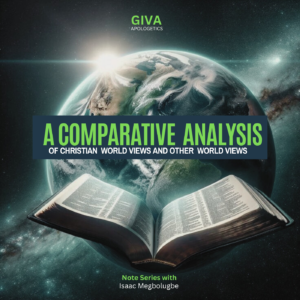A Comparative Analysis of Christian Worldview and Other Worldviews: Understanding Human Life, Essence, and Meaning in Memoir Writing

Isaac Megbolugbe
May 27, 2024
Introduction
The Christian worldview posits that human beings are God-referenced, created for a relationship with Him, and find meaning in sanctification. In contrast, other worldviews, such as existentialism, view humans as self-referenced, with life’s meaning found in self-realization and tangible outcomes. This article explores the nature of human life, essence, and meaning from a Christian worldview perspective, contrasting it with other worldviews, and examines the implications for writing and reading memoirs.
Human Life and Essence
According to the Christian worldview, human beings are created by God, given life through the breath of life, and endowed with a free will and choices (Genesis 2:7). The body, initially in a state of death, is animated by the Holy Spirit, and the soul governs relationships with God, others, and creation (Genesis 1:27). In contrast, existentialist philosophy views human life as self-referenced, with no inherent meaning or purpose (Sartre, 1943).
Meaning of Human Life
In the Christian worldview, human life finds meaning in sanctification, the process by which the Holy Spirit transforms believers into the likeness of Jesus Christ (2 Corinthians 3:18). This process declares believers righteous at birth and sanctifies them for glorification in Heaven (Romans 8:29-30). In contrast, existentialism views human life as meaningless, with self-realization and tangible outcomes being the sole purpose (Camus, 1942).
Implications for Memoir Writing
The contrastive worldviews have significant implications for writing and reading memoirs:
_Christian Worldview:_
– Memoirs may focus on the author’s spiritual journey, relationship with God, and how their faith shaped their experiences.
– The narrative may emphasize God’s sovereignty, providence, and grace in the author’s life.
– The author’s identity and purpose may be rooted in their relationship with God.
– The memoir may explore themes of redemption, forgiveness, and sanctification.
– Readers may approach the memoir with an expectation of spiritual growth, inspiration, and encouragement.
_Existentialist Worldview:_
– Memoirs may focus on the author’s individual experiences, choices, and self-discovery.
– The narrative may emphasize personal responsibility, freedom, and autonomy.
– The author’s identity and purpose may be shaped by their own decisions and actions.
– The memoir may explore themes of self-realization, authenticity, and the human condition.
– Readers may approach the memoir with an expectation of introspection, self-reflection, and a deeper understanding of human existence.
Conclusion
The Christian worldview and other worldviews, such as existentialism, hold fundamentally different views on human life, essence, and meaning. Understanding these contrasting perspectives sheds light on the nature of human existence and our quest for meaning and purpose. By recognizing the implications of these contrastive worldviews, writers and readers can approach memoirs with a deeper understanding of the author’s perspective and the themes explored in the narrative.
References:
Camus, A. (1942). The Myth of Sisyphus. Paris: Gallimard.
Sartre, J.-P. (1943). Being and Nothingness. Paris: Gallimard.
Genesis 1:27, 2:7
2 Corinthians 3:18
Romans 8:29-30